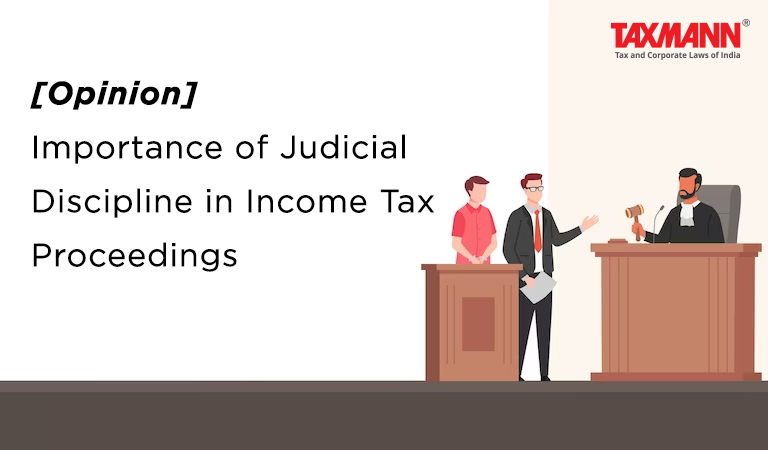[Opinion] Importance of Judicial Discipline in Income Tax Proceedings
- Blog|News|Income Tax|
- 2 Min Read
- By Taxmann
- |
- Last Updated on 20 March, 2023

Amit Kumar Gupta – [2023] 148 taxmann.com 249 (Article)
Discipline refers to rule following behaviour, to regulation, order, control and authority. Discipline plays a vital role in adjudication. Just as we require discipline in our life for it to run smoothly in the same way discipline is required in our judiciary system so that justice is granted to all as it is committed by the constitution of the Country.
It has been rightly said that “there is no better test of the excellence of a government than the efficiency of its judicial system”.Hence unless a Country adopts a fool proof justice delivery system, it cannot prevent internal conflicts and violent self-help of its citizens to secure justice. To provide Justice to its citizens, judicial discipline is to be followed by various Courts and adjudicating authorities.
Principles of judicial discipline require that orders of the higher appellate authorities are followed unreservedly by the subordinate authorities.
Article 141 of the Constitution of India stipulates that the law declared by the Supreme Court shall be binding on all Courts within the territory of India. Thus, the general principles laid down, by the Supreme Court are binding on each individual including those who are not a party to an order. Just as judgments and orders of the Supreme Court have to be faithfully obeyed and carried out throughout the territory of India under article 141 of the Constitution, so should be judgments and orders of the High Court by all inferior courts and tribunals subject to supervisory jurisdiction within the State under articles 226 and 227 of the Constitution.
Role of Judicial Discipline in Income Tax
In Income Tax, the assessing officer should follow the instructions and orders of ITAT, High Court and Supreme Court. Similarly ITAT and High Courts must follow decisions of the Courts higher in hierarchy.
In Income Tax, if an officer under any level disregards the clear and straight forward direction of the judgement passed by the Supreme Court, High Court or ITAT then it would amount to creation of chaos in administration of tax laws and will also devoid assessee of Justice. Such denial is a denial of justice, and is furthermore destructive of one of the basic principles in the administration of justice based as it is in this country on a hierarchy of courts.
Unless there is a stay granted by the authorities from the higher forum, the order of the higher forum should be complied with. In case any appeal or special leave petition is filed against an order, the same will not entitle the authority not to comply with the order of the Higher Court. Mere filing of an appeal or special leave petition will not render the assailed judgement or order inoperative.
Click Here To Read The Full Article
Disclaimer: The content/information published on the website is only for general information of the user and shall not be construed as legal advice. While the Taxmann has exercised reasonable efforts to ensure the veracity of information/content published, Taxmann shall be under no liability in any manner whatsoever for incorrect information, if any.

Taxmann Publications has a dedicated in-house Research & Editorial Team. This team consists of a team of Chartered Accountants, Company Secretaries, and Lawyers. This team works under the guidance and supervision of editor-in-chief Mr Rakesh Bhargava.
The Research and Editorial Team is responsible for developing reliable and accurate content for the readers. The team follows the six-sigma approach to achieve the benchmark of zero error in its publications and research platforms. The team ensures that the following publication guidelines are thoroughly followed while developing the content:
- The statutory material is obtained only from the authorized and reliable sources
- All the latest developments in the judicial and legislative fields are covered
- Prepare the analytical write-ups on current, controversial, and important issues to help the readers to understand the concept and its implications
- Every content published by Taxmann is complete, accurate and lucid
- All evidence-based statements are supported with proper reference to Section, Circular No., Notification No. or citations
- The golden rules of grammar, style and consistency are thoroughly followed
- Font and size that’s easy to read and remain consistent across all imprint and digital publications are applied



 CA | CS | CMA
CA | CS | CMA
